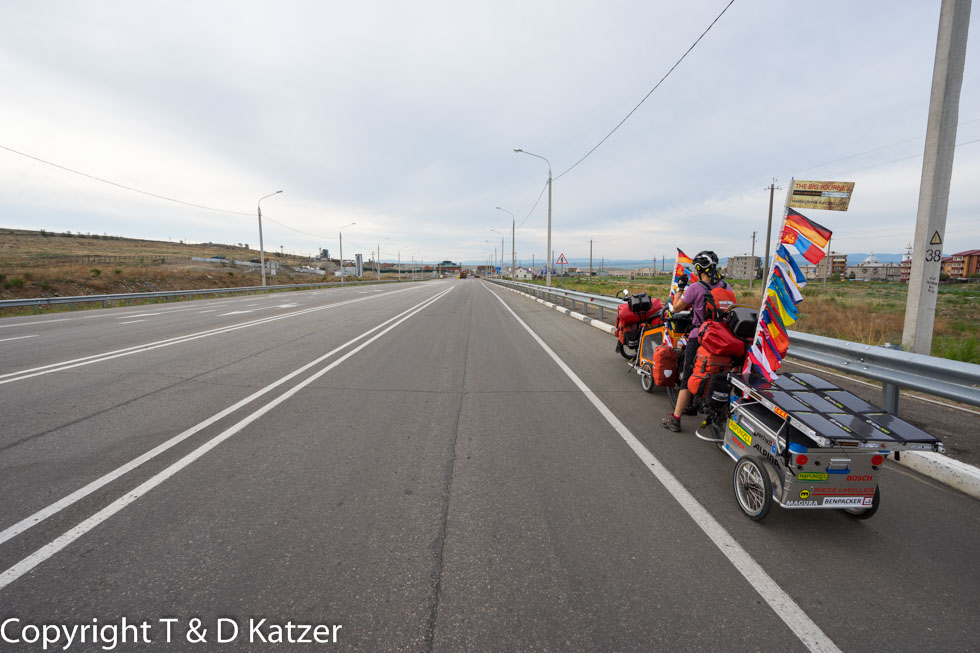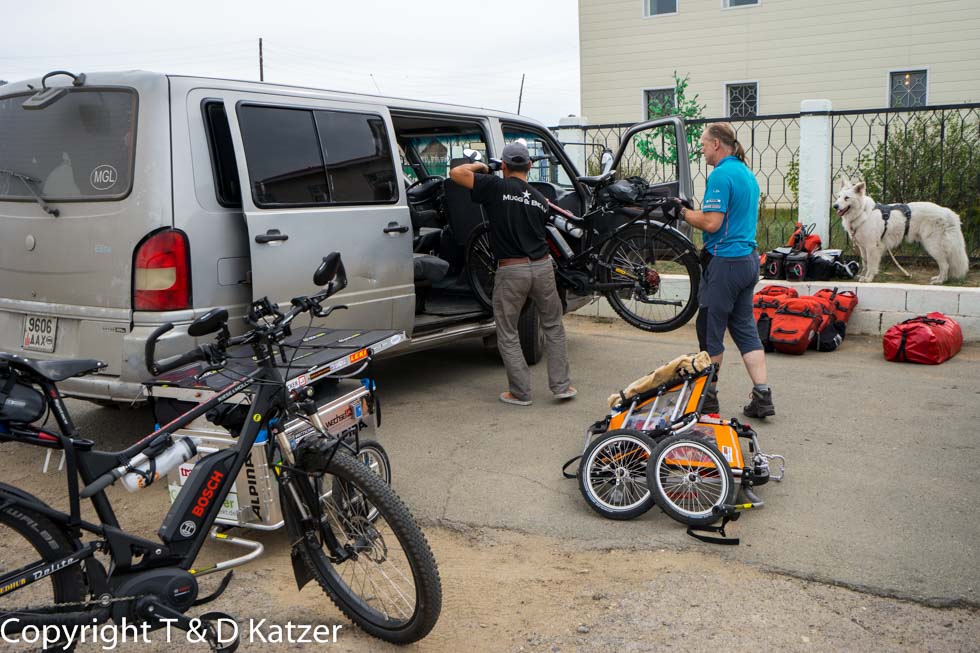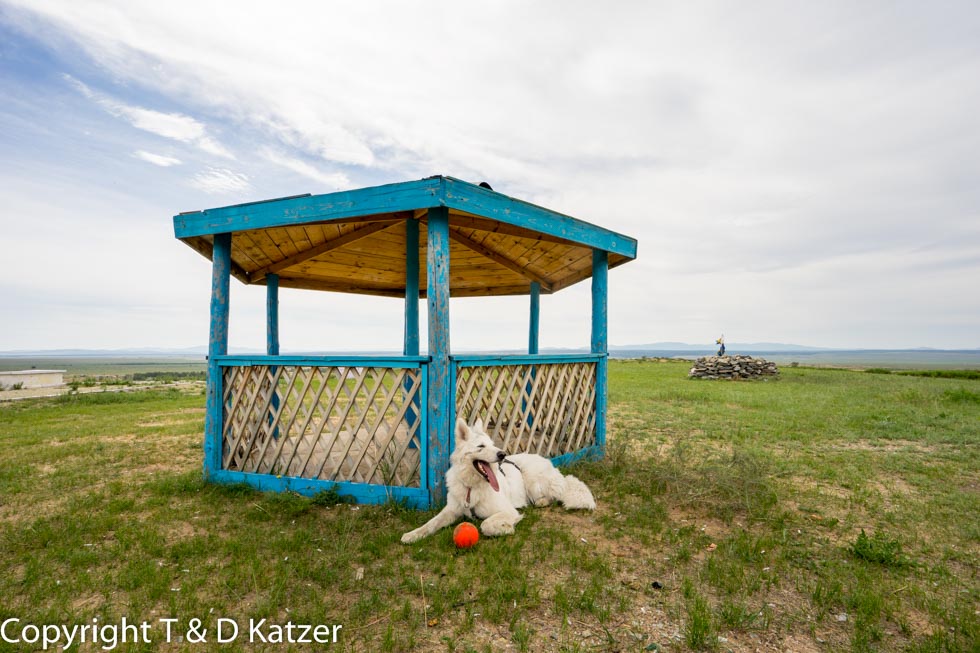
Bicycles may not cross the border
N 50°13'58.8'' E 106°12'19.2''
Day: 32-33
Country:
Mongolia
Location:
Search bataar
Camp:
Latitude N:
50°13’58.8”
Longitude E:
106°12’19.2”
Kilometers per day:
29
Total kilometers:
8,221
Aver. Sib.
21 km/h
Travel time hrs
1:22
Ground conditions:
Asphalt
Maximum height:
700 meters
Sunrise:
06:18 a.m.
Sunset:
9:44 pm
Temperature day max:
50 ° in the sun
Departure:
7:10 a.m.
Arrival time:
5:30 pm
“Beep, beep! Beep, beep!”, the arm computer wakes me from my sleep. It’s pitch black. Yawning, I press the little button on the watch to light up the display. 5:00 a.m. The inconspicuous number lights up at me in cold arrogance. I press another button to stop the horrible beeping, turn to the other side and fall asleep again when a few moments later it beeps at me from Tanja’s side. “Please turn the damn clock off,” I say. “We have to get up. We have a big day ahead of us today,” Tanja replies. “I know,” I say, rubbing my eyes and sitting up so I don’t fall asleep again. “I didn’t sleep well. This monkey heat in the little room and all the mosquitoes were certainly to blame for my bad dreams,” I muse and get dressed as if in a trance.
Two hours later, the temperature is still pleasant and the sky is overcast as we sit on our bikes and pedal along a gravel track to the main road. “Gdje nachoditza Graniza?” (Where is the border) we ask as the road forks and no sign points the way. A soldier points to the left. Then we can already recognize the buildings in front of which a small queue of cars has formed. We roll through the narrow lane that opens up between the trucks, minibuses and cars. “Those are cyclists up ahead, aren’t they?” says Tanja. “Indeed,” I reply, surprised to recognize the first Europeans on bikes. “They look at us with interest. “Where have you come from?” I ask the couple, who are traveling with surprisingly little luggage and are in the process of loading their bikes into the trunk of a car. “We are from France, have flown our bikes to Ulan Ude and are riding all the way to Ulan Bator,” they reply. “Why are you putting your things in the car?” wonders Tanja. “The Russians won’t let us leave the country on bicycles. The only way to cross the border is by car. We’ve tried everything but we can’t get any further. The nice women here have offered to take our bikes across the border for a fee,” we are shocked to hear. “That can’t be right. We cycled across the border right here a few years ago without any problems. What’s the point of having to load bikes into a car?” I say, shaking my head. “No idea. You can try your luck,” they reply and wish us every success. When we reach the barrier, we are immediately stopped by a Russian border guard. “They’re not allowed through here on bicycles,” he says. “But they’re not bicycles. They are e-bikes. They have nothing to do with a bike,” we reply, hoping to convince him. “E-bikes? Schto eta? (What’s that?) he asks in amazement. “They’re electric bikes. Something similar to a motorcycle, only we don’t have a petrol engine but an electric motor. You see here? That’s the motor,” I explain, pointing to the small black box on the bottom bracket. “But there are pedals. So it’s a bicycle.” “No, no, it’s an e-bike. Not a bicycle. You see here? That’s the gears. You can use it to engage the different gears.” “Does this thing ride without having to pedal?” “But yes,” I fib. “The pedals are only there so that we can put our feet down. Just like on a motorcycle.” “Hm, I don’t know. I’ll have to talk to my boss on the phone,” he says, brooding but very friendly. As soon as he’s gone, we hope that our bluff will work. “If that doesn’t work, we’ll have to find transportation.” “It will work out,” Tanja replies confidently, but the doubt in her voice cannot be ignored. In the meantime, the car with the two Frenchmen is right behind us. The supposedly nice Mongolian woman gets out and, gesticulating wildly, tries to scare us away from our position. In the meantime we know that the border only opens at 9:00 a.m. and nobody is allowed to cross before then. When we don’t listen to the woman’s unpleasant and increasingly loud nagging, she starts shouting at us at the top of her voice and calling us wild names. “The border doesn’t open for another 30 minutes. No reason to send us away,” we try to make her understand. Then the younger of the two starts to press the horn wildly. When we still make no move to leave our post, she turns the ignition key, drives menacingly towards us and lets the engine roar. At this point at the latest, I would like to drag her out of the car and choke her vigorously, but I remain calm. We don’t want to look bad in front of the Russian border guard who still owes us the answer as to whether we are allowed to pass with our special bikes or not. The atmosphere is extremely tense because of the horrible Mongolian woman who won’t stop barking loudly behind us and the nasty driver who won’t stop honking at us. We put on a good face, smile and continue to ignore the monster duo behind us, who have locked the two Frenchmen in their totally rusty metal box when the officer comes back. The two aggressive descendants of Genghishekhan immediately stop their psychological terror. “Do you have vehicle documents for your electric motorcycles?” I am asked the crucial question. “No. Because you can only ride them at 25 km/h, you don’t need any papers,” I try to get us out of the jam. “But customs won’t like that at all. They’ll want to see your papers or you won’t be able to cross the border with your bikes,” he replies calmly and still in a very friendly manner. Before we can say anything back, he disappears again and doesn’t reappear. Then a Russian woman appears and explains the situation to us again in perfect English. “My boss won’t let them cross the border on these bikes.” “Can we talk to him? We’ve crossed this border on bikes before,” I say. “Across this border? That’s not possible. The law forbids that.” “But they’re not bicycles.” “And where are the papers for the electric bikes? Load everything into a car and you can leave the country,” is the final statement. We realize that the barrier remains closed for us. “She’s got a lot to say. We need three cars to load everything”, I think and wonder where we are going to find a minibus quickly when we are unexpectedly approached by a Mongolian. “If you want, I can take you to Mongolia for 1,000 roubles (approx. €13.88).” “Do you have a minibus?” I ask. “Yes,” I am amazed by the answer. Days later we learn that you are not allowed to cross the border on foot or on bicycles. Many of the Mongolian cars parked on the Russian side are border cabs that take pedestrians or cyclists to Russia or Mongolia for a fee.
Half an hour later, several Mongolians and we managed to get the bikes, trailers, all the saddlebags, Ajachi and ourselves into the worn-out van. We now pass the Russian border post without any problems and get our exit stamps. When the Mongolian officials see Ajaci, they are startled at first. “Papers,” demands a woman in uniform. I give her Ajaci’s ID and fervently hope that everything goes well. “Please unload all the luggage from the bus. It has to go through the X-ray machine,” says another official. “Everything out? That’s a crazy job,” I say. “I’m sorry. Everything has to be checked.” Because the minibus is about 50 meters from the control building, I ask to be allowed to drive there. “That’s not possible. The minibus is in the lane for minibuses. It is forbidden to leave this lane.” With a great deal of energy, we drag bag after bag into the building. A friendly truck driver waiting next to us in the lane for trucks helps us. “What do we do with the heavy trailer box?” I ask the customs officer. He looks at his colleague questioningly. They wave it off, which is why the box doesn’t need to be x-rayed.
After a total of two hours, we find ourselves in Mongolia, a country with a fundamentally different culture to Russia. The people laugh more, speak a different language, are often dressed differently, look different and behave in an unfamiliar but for us familiar way as we spent almost two years here during our travels. While Tanja changes money in a small, inconspicuous bank, I unload the bikes from the minibus with the cab driver. In perfect weather, we leave the Mongolian border town of Altanbulag behind us, switch into sport mode and are about to cross the gigantic country which borders Russia to the north, China to the east, south and west, and at 1,566,500 square kilometers is about 4.5 times the size of the Federal Republic of Germany, making it number 18 among the 193 countries in the world. With 2.9 million inhabitants, Mongolia has the lowest population density of any independent country in the world. This means that there are only 1.8 inhabitants per km². In Germany, there are 285 people per km².
As soon as the border fence is behind us, the taiga has retreated to the distant mountain hills and the large valley in front of us opens up into an immeasurably wide steppe landscape. The former forest stands have been significantly reduced by logging and man-made forest fires. Almost 90 percent of Mongolia is now threatened by desertification. Another problem, as we have read, is the total overgrazing by the nomads. There are currently around 42 million farm animals that feed on pastureland.
We can hardly believe we are finally back here, in the land of Genghis, the former ruler of the world, the Kahn of the Kahns. Our feelings are overwhelming at this moment, even though we already know everything and have seen a lot. Our eyes no longer bump into anything. They glide over the steppe valley, the home of the great warrior who was also known as the Oceanic Khan and whom the Muslims called the “punishment of God” and the Europeans the “terror of the nations”. A warrior who ruled over the largest land empire that has ever existed in history. We cycle over gentle hills, past the first herds of horses, cows, sheep and goats. As every time we are in this country, I can really feel the soul of the founder of the Mongolian empire, who lived here between 1167 and 1227. What kind of person was it who, in just 20 years, forged an empire that stretched from the Pacific Ocean to the Caspian Sea and from the taiga to the foothills of the Himalayas? His military expeditions reached Iraq, northern Pakistan, the Black Sea and the Russian principalities between the Dnieper and the Volga. The ruler’s armies were like a devastating tsunami, conquering Poland and Hungary, reaching the coast of the Adriatic and making the European armies of knights tremble. Only a hunting accident, from the consequences of which the commander died in 1227, was the salvation for Europe. After the barge’s couriers brought the news of his death, the Mongol armies, who were about to incorporate Europe into their empire, retreated to Mongolia. By the standards of the 13th century, the Mongols’ highly efficient war machine was unbeatable. The fighters were well trained and motivated. They were self-sufficient and equipped with the most dangerous ranged weapon of the time. The reflex bow, made of horn, bamboo or wood, had an enormous range of 275 meters and great penetrating power. Then there were the war tactics, the high fighting morale, the horsemanship of the nomads, the well-constructed legal and tax system and the sophisticated and efficient postal and communications system. Temudjin the blacksmith, Genghis Khan’s birth name, was a genius. Undoubtedly a cruel, insatiable, power-hungry man who wanted to bring the entire population of the earth under his control. In Europe, it was said that the Mongols showed no consideration for women. That they showed no compassion for the young and no mercy for the old. “They are a vile, man-killing people. Not people, but devils. Like wild animals, they thirsted for human blood”, it was reported.
Just a few hundred meters next to us, we see two shepherds driving their herds of cattle, sheep and goats towards the road. There is something peaceful about the scene. However, if I squint my eyes, I can imagine the many animals as horsemen, galloping across the steppe in units of ten men, hundreds, thousands and tens of thousands (the tens of thousands were the most important combat units) with terrible war cries.
“How far is it to Suchbataar?” asks Tanja. “10 km”, I answer in a good mood, as the weather is kind to us and there wasn’t an icy storm that almost swept us off the road during the first few kilometers of cycling like last time.
Our bikes whiz against the strong wind that is now rising as if driven by magic energy. Since we have the electric drive, the wind, which I always called the great master, which is why I called Kazakhstan the land of wind, the one that made our lives hell for thousands of kilometers, seems to have lost its unlimited power. The Mongolian hordes, which in my imagination are pursuing us with a force of one tümen (ten thousand men), have not the slightest chance of catching up with us.
At the edge of the small town, my battery’s energy supply is exhausted. It feels like I’m suddenly cycling on a sticky mass that has nothing else in mind but to bring my heavy vehicle to a standstill. “Just one more kilometer!” I shout and cycle on without any energy. Although there is no incline, the effort is astounding. “Denis! Why are you so slow?” asks Tanja behind me. “Battery flat!” I reply, panting heavily. “Then why don’t you change it?” “We’ll be there soon. I’d like to see what it’s like without the support,” I yip as I spot the hotel we’ve stayed in before. “We only have luxury rooms for 50,000 tugrik. (22.57 €) but without hot water,” I understand the unfriendly Mongolian woman at reception. After my stay in Russia, I find it difficult to say anything in Mongolian. Even though our language skills were not good, I was able to have a rudimentary conversation in this language, which was difficult for us. But even the simple words have just slipped my mind. “Can I help you?” asks a Mongolian woman in perfect English, standing next to me at the simple reception desk. “But yes,” I reply happily and ask if we can put our bikes back in the hotel like last time. “In the courtyard,” says the unfriendly woman and shows me a huge area adjoining a factory, the fence of which is collapsing at every corner. “That’s not possible. They might get stolen there. The bikes have to go in the house,” I say, to which the woman just shakes her head. “Is there any other accommodation in this city?” I ask the English-speaking lady. “Many,” she replies. Back out on the bikes, I suddenly realize how dog-tired I am. Although we only covered 30 km, it was an exciting and exhausting day. In the meantime, a crowd of people have gathered around us. They discuss the solar panels and what they might be for. Some men examine the bikes in detail and talk shop and discuss. They seem to ignore us completely. Children knock on Ajaci’s trailer so that he turns to them for a photo. Tanja says “Ügüj!” (no) firmly to protect Ajaci from the harassment. Before more people arrive and we lose control of the situation, I quickly put in a full battery, get into the saddles and ride on. Just a few hundred meters later, we discover a simple hotel. For 35,000 Tugrik (15.80 €) we get a very run-down room that smells of smoke. Because we are allowed to put our bikes in the hallway, we check in. Then we find a small restaurant at the town’s train station to satisfy our appetite for cycling. “We made it all the way to Mongolia. That’s a reason to celebrate,” says Tanja. “Yes, the e-bikes have worked brilliantly so far. That’s a success we should really celebrate,” I agree with her and order us a Mongolian beer.
The live coverage is supported by the companiesGesat GmbH: www.gesat.com and roda computer GmbH www.roda-computer.com The satellite telephone Explorer 300 from Gesat and the rugged notebook Pegasus RP9 from Roda are the pillars of the transmission.




